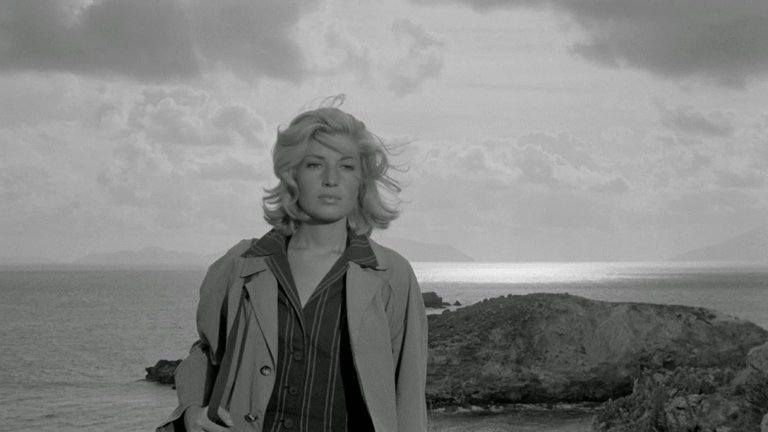Film Review: L'avventura (The Adventure, 1960)

In 1960, Federico Fellini directed La dolce vita, a film that has since become the most iconic work of his career, often hailed as one of the greatest films in the history of both Italian and world cinema. Despite its acclaim, La dolce vita does have its detractors, primarily among the more snobbish and hardcore cinephiles for whom it is not “art” enough. For them, that label was more fitting for another film released in the same year that shared many of its themes and stylistic elements: L’avventura ("The Adventure"), a drama directed by Michelangelo Antonioni.
L’avventura, like La dolce vita, is set within the milieu of the Italian upper class. The nominal protagonist, Claudia—played by Monica Vitti—is the best friend of Anna (Lea Massari), the daughter of an influential diplomat. The film begins with Claudia accompanying Anna on a yachting trip to the Eolian Islands, accompanied by Anna’s fiancé Sandro (Gabriele Ferzetti) and two other affluent couples. During their visit to a rocky island, Anna exhibits erratic behaviour, claiming there are sharks in the water while their friends swim. When bad weather forces them to leave the island, they discover that Anna has mysteriously vanished. Sandro decides to stay behind to search for her, and Claudia joins him. Their search proves fruitless, even with the involvement of authorities and scuba divers. As they continue their quest across Sicily in the vague hope that Anna may have found her way to the mainland, Sandro and Claudia slowly begin to realise their mutual attraction.
L’avventura premiered at the Cannes Film Festival, where it initially met with boos and jeers from an audience that found it perplexing; this reaction was so intense that a tearful Monica Vitti had to leave the theatre. However, despite this rocky reception, L’avventura went on to win the Jury Prize at Cannes, solidifying its status as a grand art film. Critics began to praise it extensively, and like La dolce vita, it has been referenced in English-speaking countries by its original Italian title rather than a literal translation. Its significance was further affirmed when it entered Sight & Sound’s prestigious Top 10 Best Films of All Time polls for three consecutive decades.L’avventura also holds honour of few non-English language films that is in English speaking world better known by its original, rather than English title.
Despite its acclaim and influence, L’avventura may struggle to resonate with younger generations who might find it less special due to their exposure to numerous films that have built upon its legacy. The film's lofty reputation may not withstand closer scrutiny for those unfamiliar with its historical context or narrative style. It presents challenges typical of many landmark films from the iconoclastic 1960s; its slow pace and lack of conventional plot development can be disorienting for modern viewers accustomed to faster narratives.
Nonetheless, it would be unjust to dismiss L’avventura as merely a pretentious piece of art cinema. The film is imbued with talent and hard work that is evident on screen, an achievement even more impressive in light of many financial, logistical and health problems that plagued the production. Aldo Scavarda’s black-and-white cinematography captures the haunting beauty of Sicilian natural landscapes, while the scenes at mainland highlight the fascinating juxtaposition between old architecture and encroaching modernity.
The acting in L’avventura is exemplary; Monica Vitti shines in her complex role as Claudia—a character who ultimately betrays her friend. Gabriele Ferzetti delivers a nuanced performance as Sandro, whose questionable actions contribute to the film's moral ambiguity. Lea Massari also makes a strong impression in her relatively brief appearance as Anna, a character whose action puts plot in motion.
However, terms like "motion" and "plot" are somewhat unfortunate when describing L’avventura. Antonioni's film is notorious for its extremely slow pacing and lack of significant happenings. This deliberate pacing can frustrate audiences expecting a conventional drama; indeed, the unresolved mystery surrounding Anna's disappearance leaves many viewers dissatisfied by the film's conclusion.
For those willing to engage deeply with its themes, however, L’avventura offers rich layers of meaning. It reflects on how Italian cinema evolved following World War II; Antonioni began his career influenced by Roberto Rossellini—one of neorealism's founders—but unlike neorealist films focusing on lower-class struggles, he shifts his lens onto an upper-class milieu where characters grapple with existential emptiness.
Antonioni’s focus on affluent characters—those belonging to aristocratic or bureaucratic elites—reveals how wealth fails to provide fulfilment or meaning in their lives. These characters engage in superficial relationships and fleeting affairs as they attempt to fill their emotional voids; this emptiness sometimes manifests in self-destructive behaviours or poorly considered romantic entanglements based solely on lust. Supporting characters like Claudia’s friend Giulia (played by Dominique Blanchar) exemplify this trend when she shamelessly allows herself to be seduced by a teenage aristocrat who uses his newly found hobby of painter as an excuse for women to disrobe in front of him.
While L’avventura is undoubtedly a good film replete with artistic merit and historical significance, it is best recommended only to hardcore cinephiles interested in cinema history or those viewers whose appreciation for art dramas represents an acquired taste.
RATING: 6/10 (++)
Blog in Croatian https://draxblog.com
Blog in English https://draxreview.wordpress.com/
InLeo blog https://inleo.io/@drax.leo
Hiveonboard: https://hiveonboard.com?ref=drax
Rising Star game: https://www.risingstargame.com?referrer=drax
1Inch: https://1inch.exchange/#/r/0x83823d8CCB74F828148258BB4457642124b1328e
BTC donations: 1EWxiMiP6iiG9rger3NuUSd6HByaxQWafG
ETH donations: 0xB305F144323b99e6f8b1d66f5D7DE78B498C32A7
BCH donations: qpvxw0jax79lhmvlgcldkzpqanf03r9cjv8y6gtmk9
Posted Using InLeo Alpha